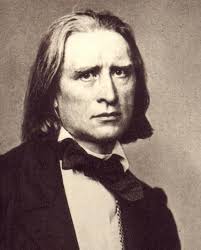
Period: Romantic
Country: Hungary
Born: 1811 in Raiding, Hungary
Died: 1886 in Bayreuth, Germany
Contemporaries: Beethoven, Berlioz, Borodin, Brahms, Chopin, Dvorak, Franck, Grieg, Moussorgsky, Rimsky-Korsakov, Rossini, Saint-Saens, Schumann, Sibelius, Smetana, J. Strauss, R. Strauss, Sullivan, Tchaikovsky, Verdi, Wagner.
Specialist Genre: Tone-poems, programme symphonies, and piano works.
What's Happening in History?
The 1800’s started with the Second Great Awakening in a Kentucky camp meeting presided by James McGready (1800-1809), Europe was taken with Romanticism, in Russia someone killed Tsar Paul I (1801), ultraviolet rays were discovered by the German physicist Johann Wilhelm Ritter (1801), Thomas Jefferson becomes the 3rd president of the United States of America (1801-1809), The Louisiana Purchase (1803), United Kingdom abolished the slave trade thanks in part to William Wilberforce (1807), War of 1812 between USA and England, Napoelon tried to take over the world, Guatemala, Panama, and Santo Domingo proclaim independence from Spain, the Greeks struggle for independence from Turkey and with the help of Russia, France and Britain gain independence (1829), Church of Jesus Christ of Latter-day Saints forms under Joseph Smith (1830), Charles Spurgeon the “Prince of Preachers” is born in England (1834-1892), Crawford Long uses ether as the first anesthetic (1842), U.S. Civil War (1861-1865), Queen Victoria becomes Empress of India (1877). So many things happening in the world and in the midst of all these things classical music was transforming. One man was very influential in this changing musical world because of his incredible piano playing, fantastic teaching, and constant support of new music. His name is Franz Liszt.
Period: Romantic
Country: Hungary
Born: 1811 in Raiding, Hungary
Died: 1886 in Bayreuth, Germany
Contemporaries: Beethoven, Berlioz, Borodin, Brahms, Chopin, Dvorak, Franck, Grieg, Moussorgsky, Rimsky-Korsakov, Rossini, Saint-Saens, Schumann, Sibelius, Smetana, J. Strauss, R. Strauss, Sullivan, Tchaikovsky, Verdi, Wagner.
Specialist Genre: Tone-poems, programme symphonies, and piano works.
What's Happening in History?
The 1800’s started with the Second Great Awakening in a Kentucky camp meeting presided by James McGready (1800-1809), Europe was taken with Romanticism, in Russia someone killed Tsar Paul I (1801), ultraviolet rays were discovered by the German physicist Johann Wilhelm Ritter (1801), Thomas Jefferson becomes the 3rd president of the United States of America (1801-1809), The Louisiana Purchase (1803), United Kingdom abolished the slave trade thanks in part to William Wilberforce (1807), War of 1812 between USA and England, Napoelon tried to take over the world, Guatemala, Panama, and Santo Domingo proclaim independence from Spain, the Greeks struggle for independence from Turkey and with the help of Russia, France and Britain gain independence (1829), Church of Jesus Christ of Latter-day Saints forms under Joseph Smith (1830), Charles Spurgeon the “Prince of Preachers” is born in England (1834-1892), Crawford Long uses ether as the first anesthetic (1842), U.S. Civil War (1861-1865), Queen Victoria becomes Empress of India (1877). So many things happening in the world and in the midst of all these things classical music was transforming. One man was very influential in this changing musical world because of his incredible piano playing, fantastic teaching, and constant support of new music. His name is Franz Liszt.
No comments:
Post a Comment
Now it's your turn, what do you think?